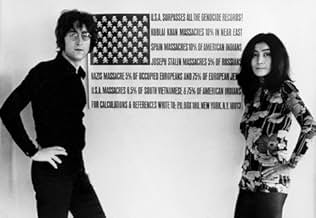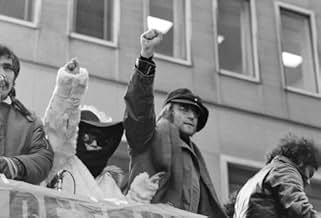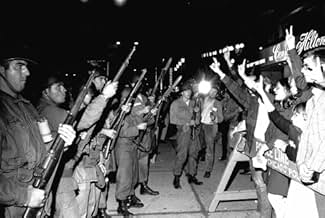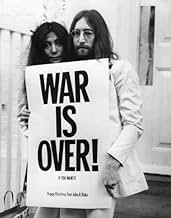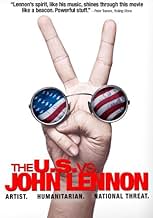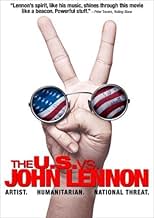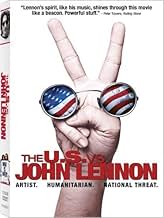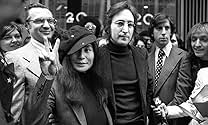CALIFICACIÓN DE IMDb
7.3/10
5.7 k
TU CALIFICACIÓN
Agrega una trama en tu idiomaA documentary on the life of John Lennon, with a focus on the time in his life when he transformed from a musician into an antiwar activist.A documentary on the life of John Lennon, with a focus on the time in his life when he transformed from a musician into an antiwar activist.A documentary on the life of John Lennon, with a focus on the time in his life when he transformed from a musician into an antiwar activist.
- Dirección
- Guionistas
- Elenco
- Premios
- 2 nominaciones en total
John Lennon
- Self
- (material de archivo)
- Dirección
- Guionistas
- Todo el elenco y el equipo
- Producción, taquilla y más en IMDbPro
Opiniones destacadas
I was in high school in 1980 when John Lennon was assassinated and all I really knew about him was that he was a musician and a member of the Beatles. I found this documentary fascinating, which gave an excellent insight into Lennon's participation in and effect on the anti-war movement in the US during the Vietnam War. I came away with a greater respect of the man and what he tried to do along with with his wife and the pressures they faced from the US government who wanted to silence them. Although some parts were something of a rehash about the anti-war movement in general, the skillful editing along with use of numerous interviews and recorded material still made it enjoyable and informative. One can not help but draw a comparison between this film and message and the on-going debate over the Iraq war, which I suspect was one of the goals of those who made it. I saw this film at a suburban Washington DC theater this weekend, and when one of the interviewees said "John Lennon represented light, and Mr. Nixon and Mr. Bush represented death" at least half the audience clapped. I guess it made its point to this audience. If you get a chance to see it, I highly recommend it.
Imagine, for a moment, you could do anything. What would you do? Already at the height of his career, the sheer scale of possibilities before John Lennon amazed even this high-aspiring rebel. Triggered in no small part by his meeting with Yoko Ono, a conceptual artist obsessed with breaking down barriers, Lennon had to decide if there was a greater purpose to which he could devote his musical talent, fame and fortune. Mass protests against the Vietnam War were sweeping America. Lennon's aspiration became quite simple (some would say simplistic): let's give peace a chance. The U.S. vs. John Lennon uses previously unreleased archive footage, plus documentation obtained under the Freedom of Information Act, to chart this ex-Beatle's political activism and his struggle with the U.S. authorities in the late 60's and early 1970's.
It's a remarkable tour de force. Many people know Lennon as an ex-Beatle, for his song Imagine and the fact that he got shot. The extent of his political activism, the method in his apparent madness, would seem more like another conspiracy theory in less capable hands. Lennon's efforts seem directly linked (initially) to getting another activist out of jail and then making sure the war-bent presidency, White House and FBI lose lots of sleep over the war.
Directors Leaf and Scheinfeld are past masters at making serious pop culture retrospectives. In an age of technology and spin, how do we know 'documentary' filmmakers are telling us facts? Firstly, what's on the film. There are interviews with high-ranking former government and FBI agents. Then there are declassified documents, not just quoted but shown on the screen. Finally there is the official website which provides an external way of checking transparency and sources once you get home. If you thought Lennon was a cool guy - or maybe even your childhood hero - this film shows how incredibly cool - and courageous - he actually was.
Says director Scheinfeld: "We live in a time where everything's a reality show. John and Yoko were essentially pioneers in that, but they weren't using it to promote an album. They weren't using it to promote a movie. They weren't doing it to promote anything except peace and that's what makes them heroic artists here. And then to have the courage to stand up to the power of the United States - the presidency, the White House, the FBI and the INS . . ." Lennon's song 'Give Peace a Chance' became the national anthem of the anti-war movement. He linked up with other activists (including the Black Panther movement) using his public persona - and often his own money - to synchronise the peaceful protests and give them such force that, at the point where Nixon was campaigning for re-election, Lennon had been singled out for deportation. He backed down over personal appearances at an anti-Nixon concert tour (which would follow the latter's campaign trail) as government officials stepped up the campaign of harassment against him with wiretapping and surveillance. Rightly or wrongly, Lennon feared for his life. This was a time when the Secret Services had the authority to take people out if deemed in the national interest.
The website documentation shows how the Reagan administration continued to obstruct release of information on Lennon even in April 1981. The FBI cited its authority under the Freedom of Information Act to withhold "information which is currently and properly classified . . . in the interest of the national defense or foreign policy." The downside of the film is that many people simply won't care. Gore Vidal takes a modern sideswipe at Bush and Iraq, but the comparison is weak. Vietnam was not preceded by a 9/11 or a Pearl Harbour and the united opposition to the Vietnam War was on an unprecedented level: protests turned into riots, several civilians were shot, and the powers of the government were far reaching even by today's standards. Although the film sometimes plays like a top-notch TV documentary, the levels of professionalism shown by the filmmakers set it apart. It's also an unsung paean to the most important part of Lennon's life and what he would no doubt like to be remembered for. He might not have been Gandhi, but there was more to him than the wacky, druggy rockstar most of us remember.
"You may say that I'm a dreamer, But I'm not the only one," wrote Lennon.
It reminded me of another famous saying: "All men dream: but not equally . . . the dreamers of the day are dangerous men, for they may act their dream with open eyes to make it possible." The U.S. vs. John Lennon is more than a testament to John Lennon. It is the story of how one man tried to make his dreams reality.
It's a remarkable tour de force. Many people know Lennon as an ex-Beatle, for his song Imagine and the fact that he got shot. The extent of his political activism, the method in his apparent madness, would seem more like another conspiracy theory in less capable hands. Lennon's efforts seem directly linked (initially) to getting another activist out of jail and then making sure the war-bent presidency, White House and FBI lose lots of sleep over the war.
Directors Leaf and Scheinfeld are past masters at making serious pop culture retrospectives. In an age of technology and spin, how do we know 'documentary' filmmakers are telling us facts? Firstly, what's on the film. There are interviews with high-ranking former government and FBI agents. Then there are declassified documents, not just quoted but shown on the screen. Finally there is the official website which provides an external way of checking transparency and sources once you get home. If you thought Lennon was a cool guy - or maybe even your childhood hero - this film shows how incredibly cool - and courageous - he actually was.
Says director Scheinfeld: "We live in a time where everything's a reality show. John and Yoko were essentially pioneers in that, but they weren't using it to promote an album. They weren't using it to promote a movie. They weren't doing it to promote anything except peace and that's what makes them heroic artists here. And then to have the courage to stand up to the power of the United States - the presidency, the White House, the FBI and the INS . . ." Lennon's song 'Give Peace a Chance' became the national anthem of the anti-war movement. He linked up with other activists (including the Black Panther movement) using his public persona - and often his own money - to synchronise the peaceful protests and give them such force that, at the point where Nixon was campaigning for re-election, Lennon had been singled out for deportation. He backed down over personal appearances at an anti-Nixon concert tour (which would follow the latter's campaign trail) as government officials stepped up the campaign of harassment against him with wiretapping and surveillance. Rightly or wrongly, Lennon feared for his life. This was a time when the Secret Services had the authority to take people out if deemed in the national interest.
The website documentation shows how the Reagan administration continued to obstruct release of information on Lennon even in April 1981. The FBI cited its authority under the Freedom of Information Act to withhold "information which is currently and properly classified . . . in the interest of the national defense or foreign policy." The downside of the film is that many people simply won't care. Gore Vidal takes a modern sideswipe at Bush and Iraq, but the comparison is weak. Vietnam was not preceded by a 9/11 or a Pearl Harbour and the united opposition to the Vietnam War was on an unprecedented level: protests turned into riots, several civilians were shot, and the powers of the government were far reaching even by today's standards. Although the film sometimes plays like a top-notch TV documentary, the levels of professionalism shown by the filmmakers set it apart. It's also an unsung paean to the most important part of Lennon's life and what he would no doubt like to be remembered for. He might not have been Gandhi, but there was more to him than the wacky, druggy rockstar most of us remember.
"You may say that I'm a dreamer, But I'm not the only one," wrote Lennon.
It reminded me of another famous saying: "All men dream: but not equally . . . the dreamers of the day are dangerous men, for they may act their dream with open eyes to make it possible." The U.S. vs. John Lennon is more than a testament to John Lennon. It is the story of how one man tried to make his dreams reality.
I am too young to really remember John Lennon being alive and what I know of him is mostly based around the Beatles and his later solo efforts which, in my view, saw him becoming a bit of a peacenik under the influence of Yoko Ono. As a result this film sat on my recorder for quite a few weeks before I got round to watching it but I am glad I did because it is actually a very interesting film that is pitched perfectly to inform viewers such as myself who perhaps did not know anything about John Lennon in the latter stages of his life.
It goes without saying that the film is sympathetic to Lennon and what he was trying to do and I suppose this is a fault within the telling that the bias towards him as a person is inherently there. This will put off some viewers who simply disagree with him, draw in those that agree but to the casual viewer I doubt it will come over as a problem and indeed for me it was just something I observed rather than something that was an issue. Anyway, what the film did well for me was to acknowledge that Lennon was an artist and a peacenik but to move him beyond the images and songs that we all know. This gives him as a person more of a foundation and meaning because, viewed in context of his time he actually comes over as a key figure and an intelligent man (albeit an artist!).
I'm sure some will see this as a problem because they disagree with it but the approach works. Setting the foundation and showing Lennon speaking out (in his own way) builds well to make the later persecution by Nixon's Whitehouse to be a natural progression and believable rather than being a rather sensationalist newspaper headline (or indeed like the title of the film itself). The use of archive footage is really well done as it makes rightly makes Lennon the main character while the contributions are mostly relevant and edited into the main flow well.
An interesting and engaging documentary that sits as a fitting tribute to who John Lennon was, even if it focuses on a specific period in his life. Understandably slanted to the left politically, it will appeal to the casual viewer quite easily.
It goes without saying that the film is sympathetic to Lennon and what he was trying to do and I suppose this is a fault within the telling that the bias towards him as a person is inherently there. This will put off some viewers who simply disagree with him, draw in those that agree but to the casual viewer I doubt it will come over as a problem and indeed for me it was just something I observed rather than something that was an issue. Anyway, what the film did well for me was to acknowledge that Lennon was an artist and a peacenik but to move him beyond the images and songs that we all know. This gives him as a person more of a foundation and meaning because, viewed in context of his time he actually comes over as a key figure and an intelligent man (albeit an artist!).
I'm sure some will see this as a problem because they disagree with it but the approach works. Setting the foundation and showing Lennon speaking out (in his own way) builds well to make the later persecution by Nixon's Whitehouse to be a natural progression and believable rather than being a rather sensationalist newspaper headline (or indeed like the title of the film itself). The use of archive footage is really well done as it makes rightly makes Lennon the main character while the contributions are mostly relevant and edited into the main flow well.
An interesting and engaging documentary that sits as a fitting tribute to who John Lennon was, even if it focuses on a specific period in his life. Understandably slanted to the left politically, it will appeal to the casual viewer quite easily.
One of the younger reviewers commented:
"I couldn't help but compare the era and social climate around this movie to what we are experiencing today. I am disturbed and disappointed. Why is it that it seemed as if there were loads more people being active in what they believed back in those days. I understand that it was a different time, and many in the world were just learning to use their voices... Perhaps we feel that we just don't know enough about a subject to get behind it and speak out? ... Perhaps large protests are just being overlooked because we as viewers or the media is over it... I am just wondering why I haven't done more. Why does it seem as if people today (not just my "generation" or my "community") are fearful or apathetic towards fighting for what they think is right? I don't want to preach or be dramatic here - I'm not telling you to view things my/their/our/its/his/her way. I'm just saying, I can't imagine that we've gone through life without seeing some sort of injustice - there has to be something you've seen that you think is wrong... why not say something about it? Is being charitable enough anymore? Awareness is key. Why is there this silence amongst us?"
Perhaps I'm being too simplistic, but I've often thought as a survivor of the Viet-Nam era, that the main reason we haven't seen protests of the magnitude depicted in The US vs John Lennon in recent times is simply the absence of the draft. Plenty of people again object to the war situation, but without the threat of involuntary servitude there simply is no critical mass. The fear of self, friends, and family being rounded up and shot proved great motivation to get people out in the streets back then. The censorship of the media imposed since Viet-Nam (embedded journalists, qv) has also helped still the voices.
So at the very least, this film has helped present an historical perspective all but absent in the present day. Viet-Nam so divided the country that the divisions remain today. Yet that war is curiously neglected in our educational curricula.
Beyond that is revealed a portrait of John Lennon, artist and young man. Lennon, the single one of the Four who strove at great personal cost to better the world with far more than silly love songs is revealed here in a montage of film and stills that conveys far more than the press of the time was able or wiling to.
The film opens with footage from his 1971 appearance at the John Sinclair Freedom Rally at Crisler Area in Ann Arbor, Michigan. As a former UM Ann Arbor Student I particularly appreciate how the producers of the film illustrate the pivotal nature of that event. At the time the event seemed like a big deal locally, but one that was lost amongst the din of social commotion. As close as I was geographically, I didn't realize then just how influential Lennon's (or Sinclair's) involvement was in the successful movement to end the war.
I suggest that any student (young or older) of how that peace movement progressed back then should see this film. Serious students should see it more than once. In addition to the collection of seldom seen film footage, there is a very fine sound track. See the film on the big screen if you can. I'll put my order in for the DVD as soon as it can be had, but the big screen, hi-fi version rocks.
"I couldn't help but compare the era and social climate around this movie to what we are experiencing today. I am disturbed and disappointed. Why is it that it seemed as if there were loads more people being active in what they believed back in those days. I understand that it was a different time, and many in the world were just learning to use their voices... Perhaps we feel that we just don't know enough about a subject to get behind it and speak out? ... Perhaps large protests are just being overlooked because we as viewers or the media is over it... I am just wondering why I haven't done more. Why does it seem as if people today (not just my "generation" or my "community") are fearful or apathetic towards fighting for what they think is right? I don't want to preach or be dramatic here - I'm not telling you to view things my/their/our/its/his/her way. I'm just saying, I can't imagine that we've gone through life without seeing some sort of injustice - there has to be something you've seen that you think is wrong... why not say something about it? Is being charitable enough anymore? Awareness is key. Why is there this silence amongst us?"
Perhaps I'm being too simplistic, but I've often thought as a survivor of the Viet-Nam era, that the main reason we haven't seen protests of the magnitude depicted in The US vs John Lennon in recent times is simply the absence of the draft. Plenty of people again object to the war situation, but without the threat of involuntary servitude there simply is no critical mass. The fear of self, friends, and family being rounded up and shot proved great motivation to get people out in the streets back then. The censorship of the media imposed since Viet-Nam (embedded journalists, qv) has also helped still the voices.
So at the very least, this film has helped present an historical perspective all but absent in the present day. Viet-Nam so divided the country that the divisions remain today. Yet that war is curiously neglected in our educational curricula.
Beyond that is revealed a portrait of John Lennon, artist and young man. Lennon, the single one of the Four who strove at great personal cost to better the world with far more than silly love songs is revealed here in a montage of film and stills that conveys far more than the press of the time was able or wiling to.
The film opens with footage from his 1971 appearance at the John Sinclair Freedom Rally at Crisler Area in Ann Arbor, Michigan. As a former UM Ann Arbor Student I particularly appreciate how the producers of the film illustrate the pivotal nature of that event. At the time the event seemed like a big deal locally, but one that was lost amongst the din of social commotion. As close as I was geographically, I didn't realize then just how influential Lennon's (or Sinclair's) involvement was in the successful movement to end the war.
I suggest that any student (young or older) of how that peace movement progressed back then should see this film. Serious students should see it more than once. In addition to the collection of seldom seen film footage, there is a very fine sound track. See the film on the big screen if you can. I'll put my order in for the DVD as soon as it can be had, but the big screen, hi-fi version rocks.
For those of us who followed Lennon and the Beatles through those tumultuous years, this was a simple summary that really didn't break any ground or uncover any new information. The filmmakers were more excited to find a few pieces of lost or mislabeled footage, such as Lennon being given his green card, than to enlighten those of us who were along for the ride all along. But it was good to hear from John again, even to say "flower power didn't work, so what? You do something else." No coverage was given John's activism or lack thereof during his infamous "lost weekend." Yoko's constant presence saw to that.
But I would love for my son and his generation to see it. Much of what is going on today has gone unchallenged, and the return of the J. Edgar Hooverization of America has been obvious to those of us who were awake back then.
But I would love for my son and his generation to see it. Much of what is going on today has gone unchallenged, and the return of the J. Edgar Hooverization of America has been obvious to those of us who were awake back then.
¿Sabías que…?
- Citas
Gore Vidal: Patriotism is the last refuge of the scoundrel.
- Bandas sonorasJohn Sinclair
Written by John Lennon
Performed by John Lennon
Courtesy of Capitol Records
Under license from EMI Film & Television Music
Selecciones populares
Inicia sesión para calificar y agrega a la lista de videos para obtener recomendaciones personalizadas
- How long is The U.S. vs. John Lennon?Con tecnología de Alexa
Detalles
- Fecha de lanzamiento
- País de origen
- Idioma
- También se conoce como
- Los EE.UU. contra John Lennon
- Productoras
- Ver más créditos de la compañía en IMDbPro
Taquilla
- Total en EE. UU. y Canadá
- USD 1,109,146
- Fin de semana de estreno en EE. UU. y Canadá
- USD 69,143
- 17 sep 2006
- Total a nivel mundial
- USD 1,408,065
- Tiempo de ejecución1 hora 39 minutos
- Color
- Relación de aspecto
- 1.78 : 1
Contribuir a esta página
Sugiere una edición o agrega el contenido que falta

Principales brechas de datos
By what name was The U.S. vs. John Lennon (2006) officially released in India in English?
Responda

